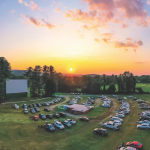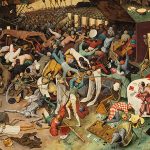
Fifty years ago this year, we had Woodstock’s three days of peace, love and mud, and within months it was bookended by Altamont’s first festival fatality due to violence. From John Sebastian’s laid-back stoner mantra “You’re so amazing!” to Mick Jagger’s impotent pleas of “C’mon now people! People?!” as Meredith Hunter was stabbed to death by a Hell’s Angel in front of the stage. And the narrative was set: Live music would become the mythical landscape of competing angels, the ones that played concerts for the good of society and the ones that whispered in their ears and dangled vials of cocaine.
In total, it would appear that our better angels won out. The list of benefit concerts — pro bono events dedicated to a particular cause — is as epic as some of the concerts themselves. There was 1985’s Live Aid, precisely recreated last year for the Freddie Mercury biopic Bohemian Rhapsody; that same year saw “We Are The World,” the fundraiser for African famine relief and Farm Aid, in support of American agricultural workers. In 2001 came the Concert For New York at Madison Square Garden in the wake of the 9/11 attacks. A few years later, a pair of benefit concerts to support victims of hurricane Katrina underscored how the focus of the industry’s charity had shifted from social themes to those around climate concern. The environmental theme was front and center again in 2010 when Hope for Haiti Now raised funds for earthquake victims in that country.
But those events and others began to reflect how benefit concerts and those who performed at them were narrowing their focus around ethnic and racial lines. Since then, the boundaries of social-justice themes have grown sharper. Harry Styles voiced support for women’s and LGBTQ issues but was criticized for not being equally vocal about the Black Lives Matter movement at a concert in London in 2017. Meanwhile, a BLM concert organized by Broadway music stars in 2016 was canceled “due to conflicting viewpoints on the social issue,” according to theater trade publication Playbill.
As the country becomes further politically and socially polarized, it seems to be taking its music with it, creating a froth of anodyne pop stars at the top, most of whom studiously avoid polemics. On the other hand, maybe it was always thus. Farm Aid was hardly a Klan outing, but only the presence of B.B King kept the bill of what we would later call Americana artists like Willie Nelson, Neil Young, Loretta Lynn, Roy Orbison and John Mellencamp from being all-Caucasian. If Farm Aid was largely racially segregated, it was organically so, as most American farmers are white. But other benefit shows revealed similar unconscious biases: No Nukes, a 1979 show in New York to promote safe energy was putatively intended to keep us all nonradioactive but also fell into the category of affluent causes aimed at decidedly first-world problems.
And as the music business of the 1970s, ‘80s and ‘90s grew in affluence, its causes seemed more and more remote from the people ostensibly playing for their benefit. No one on the stage at Farm Aid was actually a farmer (through Willie was definitely cultivating something); with the exception of Ravi Shankar, no one on stage at The Concert For Bangladesh in 1971 would have blended in with a crowd in Dhaka; and everyone at Live Aid looked pretty well fed, even David Bowie.

Closer To Home
But look at the themes of more recent benefit concerts: they’re fewer and further between now, and they’re hitting much closer to home. Ariana Grande’s 2017 One Love Manchester show raised funds for the victims of the Manchester Arena terror attack weeks earlier, and which took place just as Grande’s own touring show there had ended. Other high-profile benefit productions in the last decade include shows for events like the 2016 Paris Bataclan terror attack and the 2011 Indiana State Fair stage collapse. We see the focus of benefit shows shifting from very real but still arm’s-length issues such as famine in Africa and AIDS in gay America to the very venues that artists themselves perform in night after night. Like the rest of the world, and especially in America, they have become far less safe. The themes of benefit concerts, like the bullets of the mass shootings they increasingly mourn, are striking much closer to home now.

That may be the new normal. Over a dozen major artists came together to commemorate the 2017 Las Vegas concert shooting. More recently, Billboard Best New Artist and multiple Grammy Award nominee Khalid pulled together a star-studded benefit concert for victims the attack that killed 22 people at a Walmart in his adopted hometown of El Paso. Expect more such shows: 53 people died in mass shootings in August alone in the U.S., including seven, again in Texas, just days before Khalid’s concert.
Musicians and others in the concert business are starting once again to use their platforms as a way to foster change, but it’s going to take some serious spine to sustain that in the current social environment. Why? Those who don’t share a particular point of view are no longer expressing that by simply not buying a ticket. In August, the activist Brooklyn-based hip-hop collective Beast Coast was forced to cancel a concert in Detroit after police received multiple threats against the show. The same week, Chvrches announced they would pull out of a planned show in Hong Kong in the face of continued pro-democracy protests in the city. And in Russia, it’s been a free-for-all, with nearly a dozen shows cancelled this year based on political and social resistance. Most of them were by artists you’ve never heard of; chances are, now, you never will.
The power of live music to bring people together around a cause may be about to be tested to an extent not seen for decades, and at a time when opposition to that kind of activism has never been more virulent. The metaphorical heads of the Dixie Chicks remain firmly impaled on posts outside the gates of the culture, a reminder of the costs that some artists may have to pay for crusading. Each will determine their own threshold for that kind of pain, and more importantly, where it sits in relation to the good an amplifier on 11 can do.



